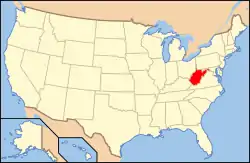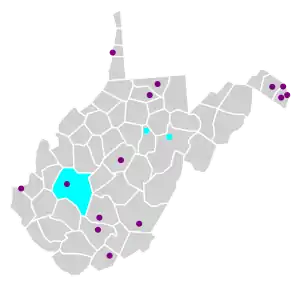LGBT rights in West Virginia
Lesbian, gay, bisexual, and transgender (LGBT) people in the U.S. state of West Virginia face legal challenges not faced by non-LGBT persons. Same-sex sexual activity has been legal since 1976, and same-sex marriage has been recognized since October 2014. West Virginia statutes do not address discrimination on account of sexual orientation or gender identity; however, the U.S. Supreme Court's ruling in Bostock v. Clayton County established that employment discrimination against LGBT people is illegal.
 West Virginia (USA) | |
| Status | Legal since 1976 |
| Gender identity | Transgender persons allowed to change legal gender |
| Discrimination protections | Protections in employment; several cities have passed further protections |
| Family rights | |
| Recognition of relationships | Same-sex marriage since October 9, 2014 |
| Adoption | Same-sex couples allowed to adopt |
Laws against same-sex sexual activity
Upon statehood in 1863, West Virginia inherited Virginia's "buggery" law, which provided for one to five years' imprisonment for anal intercourse. Fellatio (oral sex) was not covered by the statute. A bill to extend the law's application to include oral sex, whether heterosexual or homosexual, passed the House of Delegates in 1917, but failed in the Senate. In 1930, the state underwent a comprehensive criminal code revision, which resulted in the elimination of the term "buggery" and the insertion of "crimes against nature", which were defined as homosexual or heterosexual sodomy (anal sex and oral sex), with penalties varying between one to ten years' imprisonment. The law did not distinguish between consensual and non-consensual sodomy, or whether the act had occurred in private or public.[1]
It is unclear how the law was enforced. There are only four recorded sodomy court cases in West Virginia, three of which were overturned by the Supreme Court.[1]
West Virginia repealed its sodomy law in March 1976.[2]
Recognition of same-sex relationships
Same-sex marriage became legal in West Virginia on October 9, 2014, when Attorney General Patrick Morrisey announced he would no longer defend the state's ban on same-sex marriage in court and Governor Earl Ray Tomblin directed all state agencies to comply with recent federal court rulings that established the state's ban was unconstitutional.[3]
A state statute defines marriage as being between a man and a woman. In 2009, a bill that would amend the Constitution of West Virginia to ban same-sex marriage in the state was overwhelmingly voted down (67-30) by the House of Delegates. All 29 House Republicans voted to move the measure out of committee, along with one Democrat. The amendment was heavily supported by Evangelical groups in the state and the Family Council Policy of West Virginia.[4] In 2010, The Marriage Protection Amendment was re-introduced in both the House of Delegates and the Senate. Republican efforts to discharge the measure from the House Constitutional Revision Committee were defeated (68-30), and the amendment was later defeated in the Senate.
In December 2011, Delegate John Doyle introduced a bill to legalize civil unions in West Virginia as one of his last acts before retirement in 2012.[5][6] It was submitted to the House of Delegates in February 2012 and died without a vote.[7]
West Virginia extended hospital visitation rights to same-sex couples through a designated visitor statute.[8]
McGee v. Cole
On October 1, 2013, Lambda Legal filed a lawsuit, McGee v. Cole, in U.S. District Court on behalf of three same-sex couples and one of their children challenging the state's denial of marriage licenses to same-sex couples. The suit named two county clerks as defendants.[9] On November 21, West Virginia Attorney General Patrick Morrisey asked the court to allow his office to defend the state's statutes,[10] and on December 19 both he and the clerk asked the court to dismiss part of the suit.[11] On January 30, 2014, the judge assigned to the case, U.S. District Judge Robert C. Chambers, dismissed the part of the suit challenging the state's refusal to recognize same-sex marriages from other jurisdictions, since none of the plaintiffs had married elsewhere, but he invited the plaintiffs to add plaintiffs that had done so and the plaintiffs said they were considering that.[12]
On June 10, 2014, Judge Chambers ordered a stay of proceedings until a ruling in Bostic v. Shaefer, a same-sex marriage case in the Fourth Circuit Court of Appeals. The district judge reasoned that "because of the overlap in the issues present" the Virginia case should be decided first.[13] His order matched those in two other same-sex marriage cases in the Fourth Circuit: Harris v. Rainey, a Virginia case, and Bradacs v. Haley, a South Carolina case.
Adoption and parenting
Married same-sex couples are permitted to adopt, and lesbian couples have access to assisted reproduction services such as in vitro fertilization. State law recognizes the non-genetic, non-gestational mother as a legal parent to a child born via donor insemination, but only if the parents are married.[14] Gestational and traditional surrogacy arrangements are valid and recognized in the state. The state treats different-sex and same-sex couples equally under the same terms and conditions.[15]
Discrimination protections

State statutes do not address discrimination on account of sexual orientation or gender identity. A bill that would have prohibited discrimination based on one's sexual orientation was passed by the state Senate in March 2009,[16] though was killed by the House later that month.[17] In both 2010 and 2011, the bill was re-introduced in the House of Delegates and Senate but stalled in committee. In 2013, a bill was introduced again in the House and Senate.[18][19]
Several cities have adopted anti-discrimination ordinances, prohibiting unfair discrimination based on sexual orientation and gender identity in the areas of employment, housing and public accommodations. These are Athens, Beckley, Charles Town, Charleston, Fairmont,[20][21] Harpers Ferry, Huntington, Lewisburg, Martinsburg, Morgantown, Shepherdstown, Sutton, Thurmond and Wheeling.[14] In addition, Kanawha County,[22] Buckhannon,[23] and Elkins have policies banning discrimination based on sexual orientation and gender identity against county/city employees.[24]
Bostock v. Clayton County
On June 15, 2020, the U.S. Supreme Court ruled in Bostock v. Clayton County, consolidated with Altitude Express, Inc. v. Zarda, and R.G. & G.R. Harris Funeral Homes Inc. v. Equal Employment Opportunity Commission that discrimination in the workplace on the basis of sexual orientation or gender identity is discrimination on the basis of sex, and Title VII therefore protects LGBT employees from discrimination.[25][26][27]
Transgender rights
West Virginia law permits transgender individuals to change the gender marker on their IDs, driver's licenses and birth certificates. The Vital Registration office will issue an updated birth certificate upon receipt of a completed "Birth Certificate Request Form" and a court order for gender change as well as payment of the applicable fees. The Department of Transportation will issue an updated driver's license and ID upon receipt of a completed "Gender Designation Form" signed by a licensed physician. Sex reassignment surgery and sterilization are not official requirements.[14][28]
Public opinion
A September 2011 Public Policy Polling survey found that 19% of West Virginia voters thought that same-sex marriage should be legal, while 71% thought it should be illegal and 10% were not sure. A separate question on the same survey found that 43% of West Virginia voters supported the legal recognition of same-sex couples, with 17% supporting same-sex marriage, 26% supporting civil unions but not marriage, 54% favoring no legal recognition and 3% not sure.[29]
A September 2013 Public Policy Polling survey found that 23% of West Virginia voters thought that same-sex marriage should be legal, while 70% thought it should be illegal and 7% were not sure. A separate question on the same survey found that 49% of West Virginia voters supported the legal recognition of same-sex couples, with 20% supporting same-sex marriage, 29% supporting civil unions but not marriage, 48% favoring no legal recognition and 4% not sure.[30]
A 2017 Public Religion Research Institute survey showed that 48% of West Virginians supported same-sex marriage, 45% were opposed and 7% were unsure.[31]
| Poll source | Date(s) administered |
Sample size |
Margin of error |
% support | % opposition | % no opinion |
|---|---|---|---|---|---|---|
| Public Religion Research Institute | January 2-December 30, 2019 | 322 | ? | 64% | 28% | 8% |
| Public Religion Research Institute | January 3-December 30, 2018 | 401 | ? | 63% | 30% | 7% |
| Public Religion Research Institute | April 5-December 23, 2017 | 503 | ? | 61% | 29% | 10% |
| Public Religion Research Institute | April 29, 2015-January 7, 2016 | 640 | ? | 60% | 35% | 5% |
See also
References
- "The History of Sodomy Laws in the United States - West Virginia". www.glapn.org.
- William N. Eskridge, Dishonorable Passions: Sodomy Laws in America, 1861-2003 (NY: Penguin Group, 2008), 201, available online, accessed April 10, 2011
- Maher, Kris (October 9, 2014). "West Virginia Moves Forward on Gay Marriage". Wall Street Journal. Retrieved October 9, 2014.
- "West Virginia House Blocks Amendment Attempt". Queerty.com. March 31, 2009. Retrieved November 2, 2013.
- "Jefferson County Delegate Will Not Seek Reelection". WEPM Radio News. December 22, 2011.
- "West Virginia Delegate John Doyle Plans Civil Unions Bill". On Top Magazine. December 23, 2011.
- "Bill Introduced in W.Va. Would Allow Civil Unions". WSAZ. February 17, 2012. Archived from the original on April 12, 2013. Retrieved November 2, 2013.
- "Hospital Visitation Rights" (PDF). Hrc.org. Retrieved November 2, 2013.
- Snow, Justin (October 1, 2013). "West Virginia same-sex couples file lawsuit for marriage rights". Metro Weekly. Archived from the original on October 12, 2013. Retrieved November 18, 2013.
- "WV AG to Intervene in Gay Marriage Case". Washington Post. November 22, 2013. Retrieved November 22, 2013.
- "Federal judge asked to dismiss West Virginia gay marriage suit". Cumberland Times-News. December 19, 2013. Retrieved January 31, 2014.
- "Judge allows most of lawsuit challenging W.Va. gay marriage ban to proceed". Daily Journal. January 31, 2014. Archived from the original on February 1, 2014. Retrieved January 31, 2014.
- White, Kate (Staff Writer) (June 10, 2014). "W.Va. gay marriage suit to await higher court ruling". The Charleston (W.Va.) Gazette. Retrieved June 11, 2014.
- "West Virginia's equality profile". Movement Advancement Project.
- "What You Need to Know About Surrogacy in West Virginia". American Surrogacy.
- "West Virginia Senate passes gay anti-discrimination bill". Queerty.com. March 16, 2009. Retrieved November 2, 2013.
- "Marriage 'scare tactic' doomed gay-rights bill". Wvgazette.com. Retrieved November 2, 2013.
- A bill prohibiting discrimination based upon age or sexual orientation, House of Delegates
- A bill prohibiting discrimination based upon age or sexual orientation, Senate
- "Fairmont City Council passes Human Rights Commission ordinance including LGBTQ protective language". Metro News. September 12, 2017.
- "Voters in West Virginia Make History". Fairness West Virginia. November 7, 2018.
- "County adds sexual orientation to policy". Charleston Daily Mail. April 2, 2012. Retrieved November 28, 2012.
- Crum, Travis (May 3, 2013). "Buckhannon 5th W.Va. city to pass LGBT protections". Charleston Gazette. Archived from the original on May 11, 2013. Retrieved February 14, 2015.
- Lee, Chris (March 20, 2015). "Elkins passes nondiscrimination measure". The Inter-Mountain. Archived from the original on April 2, 2015.
- Biskupic, Joan (June 16, 2020). "Two conservative justices joined decision expanding LGBTQ rights". CNN.
- "US Supreme Court backs protection for LGBT workers". BBC News. June 15, 2020.
- Liptak, Adam (June 15, 2020). "Civil Rights Law Protects Gay and Transgender Workers, Supreme Court Rules". The New York Times.
- "West Virginia". National Center for Transgender Equality.
- Public Policy Polling: "WV against gay marriage, for Tea Party, Steelers, Reds/Bucs," September 15, 2011, accessed September 20, 2011
- "Clinton behind Cruz, other potential Republican opponents in WV" (PDF). Retrieved November 2, 2013.
- "PRRI: American Values Atlas 2017". ava.prri.org.
.svg.png.webp)